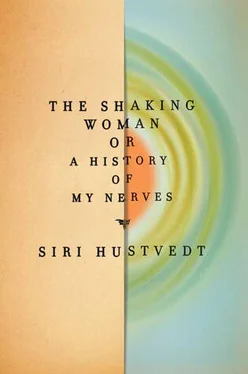Beauvoir is right that much of science (as well as much of analytical philosophy) proceeds from an anonymous third-person view of a paralyzed world, which can then be broken down into legible truths. For Francis Crick and a philosopher such as Patricia Churchland, the mind is neurons. 144It is no more or less. When we fully uncover the anatomy of the brain and its functions, the story will be told, completely. There are more nuanced positions than these. Maybe mind emerges from the brain, as some argue, echoing La Mettrie in L’Homme Machine. Or might the problem simply be a matter of your point of view? Inside my head, the world feels immediate. I look out at people and things in all their variety. I think and laugh and cry, but when you open up my skull and peek inside, all you see in there are two connected clumps of gray and white matter. And, if I am asleep, you don’t see my dreams. There are those who speculate that some form of consciousness is not limited to human beings and animals but goes all the way down to the deepest levels of the universe. Some cognitive scientists, such as Francisco Varela, and other theoreticians have drawn insights from Buddhism and various mystical practices to gain insight into a selfless reality. 145Others believe that there is a pan-psychic oneness. 146Some scientists — physicists, in particular — have left the idea of substance far behind them and delved into the curious regions of quantum theory. They are not guilty of freezing objects or leaving out the role of the observer on the observed. Apparently, in quantum field theory there are states that are seen by one person as a vacuum and by another as a mixture of particles. I have no real understanding of how this works, but I take the physicists at their word. What is seen depends on the perspective of the seer.
The theoretical physicist Jan-Markus Schwindt, a latter-day idealist, turns Crick on his head: “I do not think that mind exists in the physical world,” he writes. “I rather think that the physical world exists within mind.” 147This thought is identical to the eighteenth-century philosopher George Berkeley’s declaration that “all the choir of heaven and furniture of the earth, in a word, all those bodies which compose the mighty frame of the world, have not any subsistence without a mind.” 148And what is mind for Schwindt? “Mind consists of a conscious observing and an unconscious processing unit, like in a dream.” His proposal for a new scientific model echoes Beauvoir’s passage. It should, he writes, “take the role of the subject much more seriously than in present science which is a science of objects.” 149Schwindt is thinking not only through the lens of physics but more broadly through philosophy. Although he does not mention Berkeley, he cites both Schopenhauer and Husserl in his paper. The latter’s phenomenology was essential to Merleau-Ponty, whose book Beauvoir reviewed. She, in turn, was influenced by both Husserl and Merleau-Ponty.
Ideas are infectious, and they shape us. But how do we end up choosing among them? Isn’t it likely that our unempathetic engineer found the mechanistic models of his field amenable to his tough-minded personality? This, of course, doesn’t make his working models ineffective or wrong; but it may make other perspectives less attractive, even less comprehensible. Someone like Schwindt is used to thinking big, or small, depending on how you look at it. The notion that everything is mind doesn’t threaten him. He finds it congenial. Perhaps this is to be expected from someone who has grown accustomed to contemplating wave functions in “Hilbert spaces” or the even more uncanny “Minkowski space.” And Schwindt is by no means alone. A number of his fellow physicists believe that it is consciousness that produces physical reality, rather than the other way around. With thinkers like these, the categories tough-and tender-minded no longer seem to apply.
Imants Baruss, a psychology professor at the University of Western Ontario, conducted a study on personality and belief in 2006. He and his fellow workers produced a complex personality test, that also allowed them to profile each subject’s ideas about the character of reality, and then they correlated the results. They had expected to find the classic split between those who believe in a purely physical world, founded on the principles of a material science, and those with religious beliefs who embrace dualism, a universe made of both spirit and matter. What they hadn’t expected to find was a third category, which they called “extraordinary transcendence.” The people in this group were more likely to have had mystical or out-of-body experiences, to eschew conventional religion, and, like Schwindt, to agree with the supposition that everything is mental. They scored higher on tests for both openness and intelligence. To what degree this research reflects a broad public is anybody’s guess. But one small finding caught my attention. As part of IQ evaluations, the subjects were asked to identify objects from a scrambled image. They had to reassemble a thing in their minds that had been broken into pieces. Baruss comments, “Those who are better able to mentally synthesize visual fragments into a whole picture are more likely to believe that there is more to reality than meets the eye.” 150I would elaborate: maybe people who can integrate fragments and form a unified picture are people who understand reality as not just a sea of frozen material objects, already given to us, but as a puzzle of perceptions that depends on the viewer.
Many of us, perhaps most often as children, have wondered what it would be like to be another person, to leap out of one mind into another. Of course, to compare minds, I would have to retain an awareness of what it feels like to be me in comparison to being you. Were I you and myself at the same time, would I feel a shock? Would I say, This is so different? What if I could experience the engineer’s internal life? What if I could leap into Dr. Schwindt and understand quantum theory in a flash? What if I jumped into the poet-translator I met on that panel years ago, the man who remembers the words in novels, not the people, and read the way he does. How would the novels I have loved feel then?
The closest we can get to this entrance into another person’s mind is through reading. Reading is the mental arena where different thought styles, tough and tender, and the ideas generated by them become most apparent. We have access to a stranger’s internal narrator. Reading, after all, is a way of living inside another person’s words. His or her voice becomes my narrator for the duration. Of course, I retain my own critical faculties, pausing to say to myself, Yes, he’s right about that or No, he’s forgotten this point entirely or That’s a clichéd character, but the more compelling the voice on the page is, the more I lose my own. I am seduced and give myself up to the other person’s words. Moreover, I am often lured in by very different points of view. The more alien, inhospitable, or difficult the voice, however, the more I find myself divided, occupying two heads at once. Overcoming resistance is one of the pleasures of reading. Some texts are forbiddingly hard to read, and when a light suddenly shines on an obscure passage, understanding it (or feeling that I’ve understood it) brings happiness.
But prejudice also plays an important role in reading. An idea about what a book is can be blinding. It is not hard to see why labels such as “classic,” “Nobel Prize winner,” or “best seller” sway readers. A person in one discipline may assiduously avoid the work of people in another. A neuroscientist told me that he had mentioned Freud in a lecture once and had taken “a lot of flak for it.” Similarly, some psychoanalysts refuse to admit that neurobiology is important for their practices or they talk about egos and ids and superegos as if they were actual organs of the body, rather than concepts that allow us to imagine the workings of the mind. Continental philosophers often stay clear of Analyticals on the other side of the channel, and the other way around. We feed our beliefs and biases. Over and over in my travels as a writer I have been met with these sentences: “I don’t read fiction, but my wife does. Could you sign the book to her?” The not-so-subtle underlying message is that masculinity aligns itself with nonfiction, while femininity is associated with frivolous “made-up” stories. Real men like objective texts, not the subjective wanderings of mere fiction writers, especially female ones, whose prose, whatever its character, is tainted by their sex before a single word has been read. This absurd notion is hardly universal, but none of us is untouched by bias, predilection, taste, a preference for one metaphor over another or long-held associations so ingrained that they are wholly unconscious or barely conscious. During much of the twentieth century, hordes of scientists were so alarmed by the notions of “subjective reports” and “introspection” that the very idea of mental visualization, much less synesthesia, was regarded as very possibly a fiction.
Читать дальше












